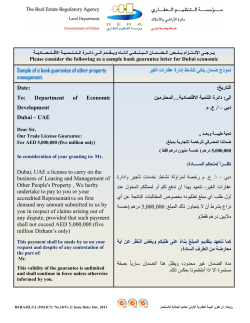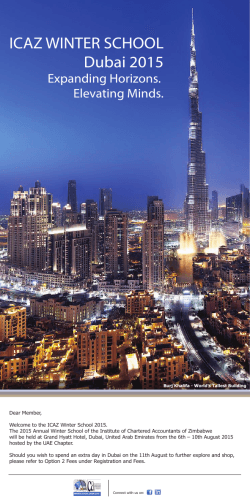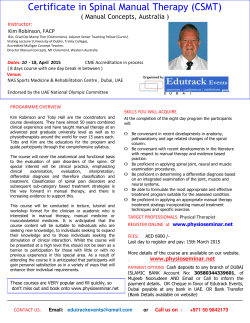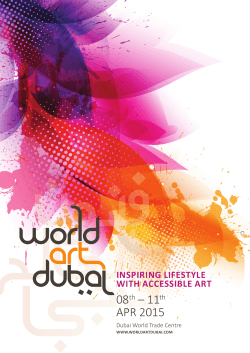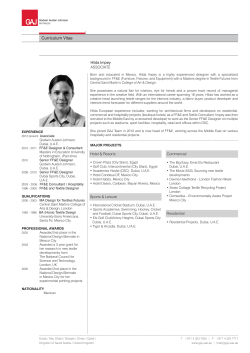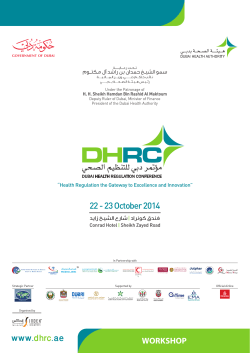
MANAGEMENT EDUCATION IN THE 21st CENTURY
Page2 Page2 Education key to 'Make in India' success: World Bank Show you’re working, that’s all that matters >> >> An OMS Initiative, The Economic Times Advertorial promotional feature MONDAY, FEBRUARY 16, 2015 Mumbai, Delhi, Chandigarh, Lucknow, Bangalore, Kolkata, Chennai, Hyderabad, Pune, Ahmedabad, Nagpur, Jaipur, Goa, Patna, Kochi, Ranchi, Bhubaneshwar, Indore MANAGEMENT EDUCATION 5 In what ways is a DCP student different from a PGDM student at IMT Ghaziabad and in what ways is he/she similar? The DCP is a unique program in India currently. It is approved by the AICTE and the diploma for PGDM is givenby IMT Ghaziabad. Students spend their 1st year in IMT’sDubai campus and the 2nd year in the Ghaziabad campus. While a lot of DCP students get PPOs from organizations from GCC countries, they also get opportunities to participatein the placement process at IMT Ghaziabad. They get to specialize on career tracks that are on offer at the Ghaziabadcampus. The DCP admissions process is the same as for Ghaziabad’s other fulltime programs: which look for high quality meritorious students with an attitude to work hard and develop their careers. The major difference is that they take a few courses in the first year that are tuned toward a non-Indian business context.They also get a chance to do internships and get PPOs from the top companies in the world. In fact one of our DCP candidates this year figures in the top decile of staring salaryoffers from a Dubai based organization with a CTC of 25 Lakhs per annum. IN THE 21st CENTURY 1 What was the thought process behind developing the Dual-Country Programme at IMT? About a decade and a half ago, IMT envisaged that management education would need to blend a breadth of global business perspectives with localised insights. With that in mind the Dubai campus was created by IMT to provide an opportunity for Indian students to experience a learning process that is practically and physically linked to an international business environment. The Dual Country Program (DCP) is a unique program for pursuing a PGDM wherein students spend one year in the Dubai campus andanother in Ghaziabad. This EXPERTS SPEAK program gives the students opportunity to learn from managerial issues and challenges in a multi-cultural business environment. While we all know that the hard and technical skills of management is geography agnostic, the biggest appeal of the DCP is that it prepares students to deal with the softer and contextual elements of running international businesses in a more immersive platform. 2 How important do you see is the need of a global outlook in today’s changing corporate environment? I think it is very important. Just look at how discontinuous innovation is changing the way businesses are done. E-businesses, for instance, MT Ghaziabad’s Dual-Country Program is one amongst the institute’s pioneering programs that has been conceptualized to provide an international experience to PGDM students. Always proactive in foreseeing the changes in the way businesses are done globally, the DualCountry Program has been launched keeping in mind the current globalization of international markets and the emerging need for MBA aspirants to be exposed to global cultures. Keeping true to the motto of “Local Depth, Global Breadth”, the Dual-Country Program makes the students adaptable to different work cultures and equips them to perform under diverse challenging work environments. Dubai is known for its futuristic lookout, its cosmopolitan population and lifestyle, its cutting edge infrastructure and its uniquely advantageous geographical position in the world economy. Regarded as one of the hubs of globalization due to its geographic location and economic environment, Dubai provides the students of the DualCountry Program a golden opportunity to gain a firsthand experience of global corporate exposure. The melting pot of multinational corporate culture, Dubai provides unique operational, functional and strategic excellence that trains students with an enriching learning experience. Designed to provide students an opportunity to work with various global organisations in India and in various middle-eastern destinations like Dubai, Abu Dhabi, Kuwait and Muscat, the program lays down an ideal platform for upcoming managers to recognize foreign markets. The exposure that students get in the program helps them gain critical insights into the working of multi-national organizations, while making them understand the global work culture better. Located strategically at the Dubai International Academic City, the IMT Dubai campus offers an excellent environment to students that help them broaden their horizon to the current business scenarios. By imbibing education from an internationally acclaimed faculty and hobnob- I target not just local but often regional and global market places!! They have operations around the globe, with regional regulations and policy frameworks to optimize. Culture is also a hugely heterogeneous mix that becomes a management challenge. In order for these teams tofunction smoothly and handle work in an effective, time bound and efficient manner, the most essential factor is aperspective that can handle diversity. An effective manager is one who is comfortable not only with diverse processes but also with diverse people. Understanding their individual issues and uniqueness yet aligning them to a common goal. Also as MNCs grow in number and size, and with the emergence of more and more Indian MNCs, organizations value human resources who can be placed anywhere in the world. These managers need to understand as well as adapt to different perspectives, cultures and outlook to implement and execute focussed strategy. 3 Why was Dubai selected as the hub for the DCP programme? Dubai is unique both in terms of geo-political position in the world as well as its economy. It is located at the juxtaposition of East and West making it a very convenient location to do business. Also due to the ease of doing business and its open nature to companies around the world to set offices, it boasts of the top MNCs and corporates having their branches. In addition to this is the World class infrastructure, life style and living standard which is comparable to any of the best cities of the world. Our campus at Dubai situated in the Dubai Academic City andboasts of credentialed faculty, great infrastructure andlearning facilities. We have a fully residential WiFi enabled campus, which very few other campuses and institutes in Dubai currently have. Our campus is vibrant from students from across the globe, as IMT Dubai also has other programs like MBA, E-MBA, BSBA and exchange programs running. An aspirant for the DCP program is at a very advantageous position to utilize all the above factors to his best capability,get exposure to world class facilities, companies, infrastructure, and faculty. 4 How does the DCP program provide practical and industry exposure to students? The DCP program exposes students to an international work environment in Dubai. Students do company projects, company visits and the likes. Senior and top executives from various companies and business groups come regularly to campus for guest sessions, business competitions, placement related interactions and other engagements. In the last few years, company visits and projects have happened with L&T,Giordano, Jumbo Electronics, Du Mapia, Discovery KidsScienceadda, Merlin, Tender Care, Samhita, Aashi AuxiChem, Innoseal Systems, Inc., Steel Authority of India,SENQI FZCo, Senqi international, and many others. Studentsalso pursue their international internships in the Middle East and other GCC countries which is a notable highlight of the program. This gives them practical knowhow and also pushes them to “get their hands dirty” in an international work place. 6 A conversation with Dr Bibek Banerjee, Director IMT Ghaziabad & Academic Mentor, IMT Group GLOBAL STUDENTS, GLOBAL PLACEMENTS IMT GHAZIABAD’S DUAL COUNTRY PROGRAM The 1st year students in Dubai also get an opportunity to pursue exchange programs in various universities across the globe where IMT Ghaziabad/Dubai has an established International Student and Academic Exchange program. In fact last year, 7 DCP students have been selected for student exchange programs to study in some of the most reputed universities including ESC Rennes, France; ESC Normandy, France; B1 Norway, Oslo, Norway and AF Kufstein, Austria. Global Placements: bing with students with a diverse international persona, the batch gets to develop their persona, which forms the rostrum of their upcoming global corporate life. In this program, students spend their 1st year in IMT Dubai and 2nd year (specializations) at IMT Ghaziabad. While the 1st year opens the students to a global outlook, the 2nd year lets them understand the nuances of Indian business culture, which shores up their professional mettle. This exposes the students to the best of both the worlds and thus transforms them into global citizens who are equipped to excel in the most challenging global environments. With a stellar line-up of who’s who of corporate world as guest faculty, the Dual-Country Program boasts of visits by numerous famous identities including Mr Rajeevalochana, Head of Merchandising, Sharaf DG; Mr Prince Arora, MD- Shells Advertising; Mr Imtiaz Hashem, Account Director, TNS Global; Ms Rima Al-Sheikh, MD, Nabeesh.com; Mr Brian McCarthy, CMO, COO, Elekta Gulf and Mr Mahesh Chotrani, Asst. VP, Jacky's amongst others. Since its inception, the Dual-Country Program has seen phenomenal growth in terms of excellent placements. Companies from all sectors participated in the Placement process of this unique program of IMT Ghaziabad. Although the placement process for all programs at IMT Ghaziabad namely Marketing, Full Time, Finance and DCP is the same, the industry and recruiters have unanimously voiced their appreciation for this noteworthy program and the unique skills sets the students bring to the table. At the IMT Dubai campus, the students are provided exposure to pertinent international business knowledge that enables them to attract Does the DCP offer placements? Are global corporate invited to hire students from the programme? DCP students get opportunities to participate in the placement processes for all companies that come for campus recruitment in Ghaziabad. Over and above this they have opportunities to be placed in Dubai, GCC and other countries, when they convert internship and short term company projects into job offers. Our placements for DCP students have been excellent in the last couple of years, with notable companies like HCL,Saraf DG, Google, Microsoft, Cognizant, Accenture, Bank of America, Infosys, Royal Bank of Scotland, Wipro, Genpact, WNS Global Services, Cisco, Hexaware Technologies, Hyundai, Hindustan Zinc (Vedanta Group), Maruti Suzuki,Birlasoft etc making offers. The average CTC for DCPgraduates this year is at over 8 Lakhs per annum. fruitful placements and lucrative remuneration packages. Some highlights for Placement season of 2015: The average compensation offered to DCP students was 9 Lakh CTC and the highest compensation offered was of 23lac CTC. This is a huge growth from last year wherein the most noteworthy compensation offered was 15lac CTC and the average was 7.66lac CTC. This shows the upward trend of the compensation being offered to the DCP graduates and the growing confidence of industry in the program. In fact the highest compensation offered to any IMT graduate in 2013-2015 batch till date was 23 Lakhs to a DCP candidate from Sharaf DG. Always at the forefront of dynamic display of acumen, the students of the Dual-Country Programme are regarded as the best brains across the paradigm of management studies. Accolades such as - Best Business plan award (Vaudeville Stock Exchange) in Incubation Week at IMTDubai; Winners of Suit Up - an event to suit up and prove their case right, be it ethical or business at Vaudeville 2014; Winner at Incubation week for B-Plan on Business Education Management judged by venture capitalists of Dubai; along with being Finalists at HULT Prize 2014, an international case study competition in partnership with former US President Bill Clinton’s Clinton Global Initiative, on building a business model for a sustainable social enterprise, bear testament to the mettle of the brilliant scholars of the Dual-Country Program. Offering a unique opportunity for students to immerse themselves in the international market and gain experience, the Dual-Country Programme develops a global mind-set that promises them much confident and smartness to live a good life. That goes to show that the best of the management students choose the Dual-Country Programme to carve out a niche for themselves and cast their names in the hallmarks of international business. For more information on applications, curriculum and placements please visit www.imt.edu Delhi University researchers suggest existence of a Vedic population whose texts date back to 8,000 BC RESEARCH SHOWS OTHERWISE KP Narayana Kumar, ET Bureau he library-cum-office room used by Prof Ramesh C Bhardwaj is testimony of one man's love for a language. The room has a number of well-used steel almirahs that store hundreds of wornout texts on Sanskrit, grammar, literature and other such. The tall, soft-spoken professor with his greying hair neatly parted at the middle fits in with the ambience of the room. Bhardwaj heads the Sanskrit department at the Delhi University and has spent decades trying to unravel, amongst other things, the linguistics of the Panchatantra. The love of the language must have been the prime reason for the academic deciding to tread the unknown territory of history as well. The Sanskrit professor is heading a team of researchers that has taken it upon itself to correct distortions about the most controversial debate in the framework of ancient India: the Aryan Migration Theory (AMT). The AMT suggests that around 3,500 years ago fair-skinned people called Aryans migrated from central Asia into north India and invaded the darkskinned people known as Dravidians and pushed them down the territory that is modern India. The theory has been opposed for years especially by right-wing groups who say that the idea of an invasion by the Aryans was invented by European scholars such as Max Mueller. Similarly, the profes- T sor also says that the Dravidian identity was also conjured up as a counter to the Aryan construct. That the Aryan-Dravidian conflict is a myth has been validated by recent genetic studies as well. But then the Sanskrit expert makes some troublesome claims by asserting that the set of people referred to as Aryans by the European scholars were "indigenous" Sanskrit speakers whose texts date back to 8,000 BC. The professor makes these claims though he does not have any archaeological evidence or other such to back him in terms of historicity. The professor also is not hassled by the idea that over 10,000 years ago, borders would have been shaped and reshaped many a time, making the point about "indigenous" people in terms of the modern nation-state rather problematic. NARRATIVE SANS EVIDENCE Bhardwaj's narrative is another instance of identifying ancient India with a Sanskritic narrative and that too without evidence. The idea becomes a bit fuzzy considering that in recent times genetic studies have established and proved beyond doubt that there are tribal communities in India that are 65,000 years old. So even though he has not taken into account the evidence provided by genetic scientists about the antiquity of tribal communities in India, the Sanskrit professor and his team plan to compare available material on the Aryan theory in school textbooks with Sanskrit texts. The team will also make recommendations to the education ministry on correcting the distortions. "We are only trying to correct the wrong history fabricated by the European scholars. The people referred to as Aryans are indigenous people and in fact India has contributed to European culture," he said. Although Bhardwaj insists that he is not driven by any right-wing ideology, the line adopted by him is popular with most Hindutva groups who blatantly back the existence of an Aryan identity and also say that the Aryans are "indigenous" people. Such debates about Aryans and Dravidians have been doing the rounds incessantly for over the last decade and was a regular feature during the NDA regime which was in power till 2004. However, for all his dedication towards Sanskrit and even the daredevilry shown by Bhardwaj in deciding to play the role of a historian, recent findings in genetics have provided new insights about the subject and now there is better understanding of what antiquity is all about. The Centre for Cellular & Molecular Biology (CCMB), Hyderabad undertook a genetic research project in 2009, which proved that there are tribal settlements in India that are much more ancient than the Sanskrit-speakers as suggested by Bhardwaj. In order to find out about the ancestry of modern Indians, the lab had taken DNA samples from hundreds of volunteers from across 13 states. The genetic research project established that the most ancient settlement of humans in India was about 65,000 years ago. They were people from Africa who had left the continent on account of water shortage. These people who had settled down in Andamans and parts of south India are the presentday tribals such as the Jarawas. So why is the professor putting up unverifiable claims about a Vedic community that's about 10,000 years old whereas there is clear scientific evidence of tribal communities that are more than six times older? When researchers in India continue to keep the focus on the Aryan-Dravidian problem, they also contribute to the existing negligence and the lack of understanding about the most ancient people of India.
© Copyright 2026

